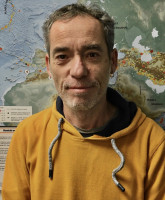Natural Catastrophes
Earthquakes & Seismic Hazards
Landslides & Mudflows
Post-Doctoral Fellowships
Belgium
2016.11.30
Assessing the risks of Earthquake ‘Domino Effect’ to improve resilience
« My work is to assess how much damage an earthquake can cause, taking into account its domino effect », explains Dr. Xuanmei Fan. « To be able to anticipate the evolution of an earthquake in space and time, I need to investigate the physical mechanisms of the hazard chain at a large scale ».
Building on the data she collected after the deadly Wenchuan earthquake of 2008, Dr. Xuanmei Fan
aims to derive a mechanistic understanding of how earthquake-induced landslides develop into multiple natural hazards. The model will help assess the occurrence probability of such a disaster chain by incorporating several components such as magnitude and frequency of the earthquakes, geology, terrain and climatic conditions. In addition, Dr. Xuanmei Fan will also take into account the vulnerability of communities and infrastructures to each kind of potential landslide-induced hazards. To achieve these objectives, Dr. Xuanmei Fan will couple field observations with satellite-based images and laboratory analysis.
Given that earthquake-induced landslides exhibit complex spatio-temporal behavior, the knowledge that will emerge from this project will be invaluably useful for the timely detection and even prediction of the cascading geological hazards. Not only will it be be beneficial to the research community, but also to the public and government for adopting suitable mitigation measures. « What we learn from the data collected in China will also be helpful for other landslide-prone regions such as Europe », Dr. Xuanmei Fan specifies. Incidentally, the researcher already planned for her risk assessment method and knowledge to be tested for the seismic region of Vrancea in the Carpathian Mountains in Europe.

Xuanmei
FAN
Institution
Université de Liège
Country
Belgium
Nationality
Chinese
Related articles
Natural Catastrophes
Climate Change
Wildfires
Climate Adaptation & Resilience
Global Warming
AXA Chair
Greece
AXA Chair in Wildfires and Climate
The consequences of climate change have never been as substantial and visible in such a wide range of places around ... Read more

Apostolos
VOULGARAKIS
Technical University of Crete
Natural Catastrophes
Volcanic Eruption
Joint Research Initiative
United Kingdom
2018.12.31
Volcanic Risk Assessment in Asia
Assessing volcanic ash hazard footprints in Asia In the language of insurance, a large volcanic ash plume represents what is... Read more

Susanna
JENKINS
